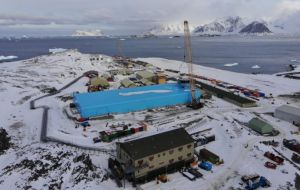MercoPress. South Atlantic News Agency
BAS Rothera Research Station has new scientific and operational support facility
 The Discovery Building at Rothera Research Station, Antarctica.
The Discovery Building at Rothera Research Station, Antarctica. Work got underway on the latest of the Royal Navy’s next-generation submarine hunters, a £840m Type 26 frigate warship which will carry the name and motto – Forward – of England’s second city, Birmingham, around the globe for a quarter of a century.A new scientific and operational support facility at Rothera Research Station for British Antarctic Survey has been made weather-tight, with the cladding complete and an operations tower installed.
British Antarctic Survey’s Construction Partner, BAM, have now completed four years of challenging construction on the Discovery Building. They are supported on site by Technical Advisor, Ramboll, and Designer, Sweco.
The team of around 54 on-site construction team members have been facing harsh weather conditions to complete this season’s program of works before their planned departure in mid April. When complete, the Discovery Building will replace several older buildings at Rothera Research Station and will support science in the region for at least the next 50 years.
The large (4,500m2) two-storey building enables scientific support and operations functions to work together under one roof.
The work is part of the Antarctic Infrastructure Modernization program (AIMP), a long-term government investment for future polar science, commissioned by the Natural Environment Research Council (UKRI-NERC).
The Discovery Building at Rothera Research Station, Antarctica. Image credit: Christopher Robert Lloyd, Ramboll
The new science and operations facility is designed to make sure the long-term impact on the environment is minimal and meets British Antarctic Survey’s net zero ambitions by 2040. The new combined heat and power plant is expected to cut carbon emissions for the entire research station at Rothera by 25%. This, along with photovoltaic solar panels, a thermally efficient building envelope and triple glazing will make the building an exemplar for energy efficiency.
The Discovery Building will feature an innovative wind deflector to minimize the accumulation of snow around the building and an operations tower to provide 360-degree views of the runway, wharf and station buildings.
Progress of the Discovery Building as work takes place on the exterior. Image credit: Christopher Robert Lloyd, Ramboll
The partnership includes construction partner BAM, design consultants Sweco and Hugh Broughton Architects providing delivery design. Ramboll is acting as technical advisors, with Norr Architects providing concept design, OFR providing fire consultancy and Turner & Townsend providing cost and commercial advice. The team will return in November 2023 for the next season of construction. The building is due to be completed in 2025.
Rothera Research Station is the UK’s largest Antarctic research and operations hub that supports leading researchers from the UK and abroad. The new Discovery Building will enable the UK to continue to deliver cutting-edge climate, biodiversity and ocean research and innovative science in Antarctica.
Elen Jones, AIMP Programme Director at BAS, said:
“To personally see the commencement of the cladding and then continue watching the Discovery Building take shape over the course of this season and ultimately achieve weathertightness as planned, is a major milestone of which the British Antarctic Survey and partners are truly proud of and is testament to our collaborative approach to infrastructure project delivery in Antarctica. Thank you and well done to everyone at Rothera for their cooperation and support during this challenging but rewarding construction season.”
Graham Hopper, Project Director at BAM, said:
Reaching this milestone safely on such a complex construction project in such an extreme environment, is testament to the dedication and motivation of the highly skilled project teams within BAM, BAS, Ramboll and SWECO and our supply chain partners. All have my thanks and admiration and should take great pride in both this achievement and in how they have collaboratively integrated within this remote research station, and facilitated continuity of BAS Science and operations.
Bruce Wulff, Project Director at Ramboll, said:
“This major milestone is the result of extensive planning to realise the solutions and innovations, which will help BAS’s science operations in a facility that also supports their net zero ambitions. The result is a testament to the entire partnership team”.
Stewart Craigie, Technical Director at Sweco, said:
“The highlight of this season’s construction has been achieving the wind and weathertight status with the completion of the envelope and the installation of the operations tower. Having personally witnessed the initiation of this activity it is great to see how the Discovery Building is developing its character in the Antarctic landscape. Well done to the team for another successful season.”
Hugh Broughton, Director, Hugh Broughton Architects, said:
“The Discovery Building will become a remarkable platform for polar science. The sustainable multi-functional facility will provide flexible space to support BAS’s activities and enhance the well-being of people living and working in an extreme, remote location. The works completed this season demonstrate the benefits of a collaborative approach to design and construction and are a testament to the skill and perseverance of a committed team, working on the project in Antarctica and in the UK.”


Top Comments
Disclaimer & comment rulesCommenting for this story is now closed.
If you have a Facebook account, become a fan and comment on our Facebook Page!